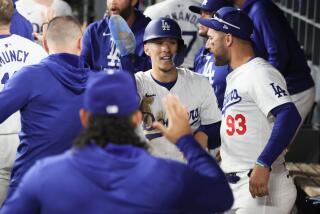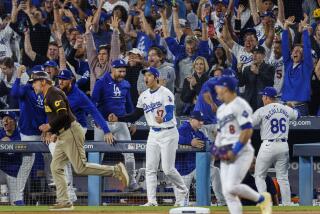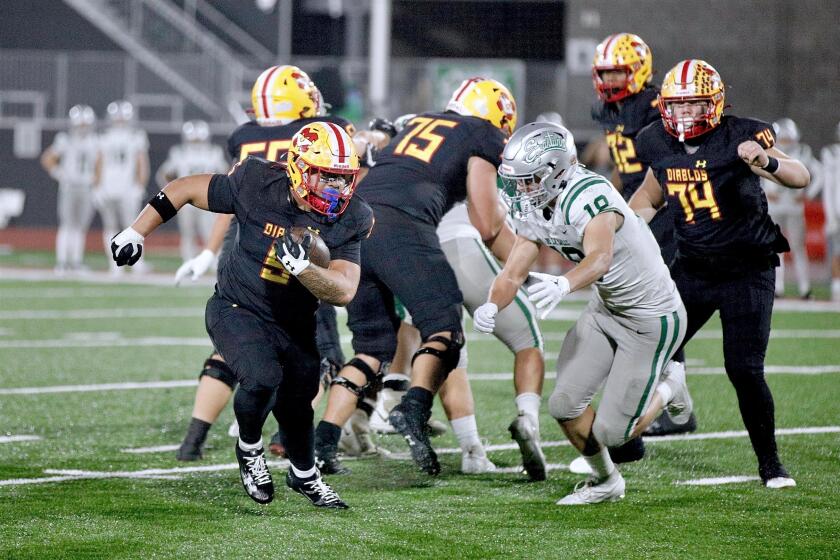Divine Rites : Baseball Is Religious in Form, and Its Rules Are Not to Be Trifled With
A reader has sent me a copy of a letter he wrote to Peter Ueberroth, commissioner of baseball, suggesting that the rules of the game be changed so that a batter who has hit a home run does not have to run the bases.
“After a batter has hit a home run,” argues Jerry Nashel of Pasadena, “it appears of no practical purpose for him to be required to touch each base and finally home plate.
“A home run is a home run. Why this ritualistic jog of seemingly no practical value? I would like to propose that the hitter have the option to jog the base paths if he chooses, and still have the run count if he chooses not to.”
I am not a sportswriter; baseball is religious in form, and sportswriters are its high priests. But baseball belongs to all Americans. Its rites are sacred and not to be trifled with. They must be protected by us laymen.
It is certainly true, as Nashel says, that once a home run has been hit, no practical purpose is served by having the batter run the bases. The ball is unplayable. The batter himself, and any runners on base at the time, are home free, so to speak.
What would Nashel have them do? Leave their bases and trot across the field to their dugout? Does he want the batter himself merely to turn from the batter’s box, tip his cap to the crowd and then withdraw?
Never. The drama of the home run does not end with the disappearance of the ball into the bleachers. We want to see each runner tagging each base; we want to count the runs as each runner crosses the plate; we want, mainly, to see the triumphant strut of the batter, the hero, as he rounds first base, knowing already that he has done it, then raises a clenched fist or doffs his cap as he takes the other bases in an exuberant gallop, while the crowd roars.
Is it possible that Nashel is too young ever to have seen a newsreel of Babe Ruth in his heyday rounding the bases, tipping his cap to the multitudes, after belting one out of Yankee Stadium? Does he not remember the Babe’s comical look, a football on toothpicks, as he made his ritualistic circuit?
Could he have missed the home run hit by Bill Mazeroski in the bottom of the ninth inning of the seventh game of the World Series between the Pirates and the Yankees in 1960? Mazeroski’s homer came with the score tied 9 to 9, and he went around the bases in a series of joyful leaps, like a gazelle, while the Pirate crowd went out of its mind.
What would he have wanted Mazeroski to do? Lean on his bat and take a bow?
Nashel might as well propose that pitchers simply wave batters to first base when they want to walk them, instead of throwing four straight balls out of reach.
Surely, the intentional walk is the most ritualistic and meaningless act in baseball. Imagine the time and boredom that would be saved if the pitcher could just nod the batter on and save all those pitchouts. But that wouldn’t be baseball.
Who knows? The pitcher might carelessly throw one the batter can reach and hit for a homer. Besides, the batter is entitled to those four pitched balls.
If the batter is so good that the pitcher is afraid to pitch to him, then why should the pitcher be able to avoid throwing those extra pitches, which theoretically won’t do his arm any good?
Besides, the deliberate base on balls gives the crowd a moment to stretch and get some peanuts.
If Nashel wants to change the rules, how about dumping the designated-hitter rule? This silly business (in the American League only, so far) allows a manager to designate a batter to bat for the pitcher, throughout the game. Thus, pitchers, who are notoriously poor batters, don’t have to bat.
Remember Don Drysdale? Don hit 29 home runs in his career and had a batting average of .186. Does that sound like an automatic out?
Who wants to see a designated hitter bat for Fernando Valenzuela? Fernando is always dangerous at the plate, and with a team like the Dodgers behind him, he sometimes has to bat to win his own games.
Baseball is an old, beautiful, chess-like game. Its rules have been worked out to mathematical perfection. It takes a fast batter almost exactly the time to get to first base as it takes a good third baseman to field a well-hit ground ball and throw him out. A good runner can get from second base to home on a single to center field. Maybe. It depends on how fast he is and how good the center fielder’s arm is.
Baseball is sacred, and any change is blasphemy.
FO
More to Read
Go beyond the scoreboard
Get the latest on L.A.'s teams in the daily Sports Report newsletter.
You may occasionally receive promotional content from the Los Angeles Times.










